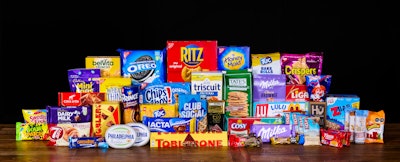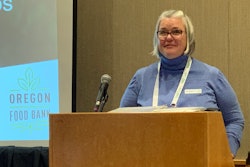Like consumer packaged goods (CPG) companies the world over, Mondelēz International is figuring out how to operate more sustainably. As a global snacking giant, it faces pressures from a variety of other angles, including leadership in regenerative agriculture; diversity, equity, and inclusion; and healthier, more mindful snacking—all at a level of transparency that consumers demand.
In its latest Snacking Made Right report, Mondelēz showcases its progress against a wide variety of environmental, social, and governance (ESG) priorities. The report highlights advances in a number of areas, including progress toward its 2050 net-zero emissions goal, as well as its Cocoa Life sourcing program.
“I am incredibly proud of our work in 2023 to continue meeting evolving consumer preferences and delivering strong results while making meaningful progress against our ESG priorities,” says Dirk Van de Put, chairman and CEO of Mondelēz International. “We made this progress despite ongoing global inflation and economic uncertainty, a testament not only to the power of our iconic brands, but also to our focused and strategic approach to sustainable growth.”
The company takes a two-pronged approach, transforming its own operations and its supply chain; and also concentrating on collective action within the snacking sector.
Mindful snacking
Over the past year, Mondelēz has made headway toward its 2025 goals, including evolving its approach to mindful snacking. This includes not only enhancing nutrient and ingredient profiles in its products, but also helping consumers make more mindful eating choices and pursue more active lifestyles.
In his letter leading the report, Van de Put makes reference to the growing use of weight-loss drugs. Though Ozempic and others like it have caused concern for companies whose prosperity relies on continued snacking, the Mondelēz CEO contends that snacking is here to stay.
“We know there is a continued place for mindful indulgence in a balanced lifestyle,” Van de Put says. “Our chocolate portfolio, in particular, including beloved brands such as Cadbury, Toblerone, and Milka, is well attuned to the 85% of consumers polled in 2023 who confirm they are likely to savor an indulgent snack.”
Mondelēz is also focused on providing healthier alternatives such as belVita biscuits and whole-grain snack bars, Van de Put adds. In mid-2022, Mondelēz also acquired Clif Bar & Co., a snacking company that helps to embody a commitment to wellbeing.
Portion-control products containing less than 200 calories now generate almost 20% of the company’s sales. “By 2025, we aim for up to 100% of our net revenue from our snacking portfolio through Mindful Portion Snacks, those in either individually wrapped mindful portion serving sizes or with mindful portion labeling,” he says.
Reducing climate impact
Mondelēz reports that it is addressing climate change through science-based approaches. Just this month, the Science Based Targets initiative (SBTi) validated the company’s near-term net-zero target, resulting in the approval of its full value chain goal to reduce absolute end-to-end greenhouse gas (GHG) emissions 35% by 2030 and net-zero by 2050 from a 2018 base year.
“We focus on areas where we believe we can make the greatest positive difference for the long term. This includes aiming to reduce our impact on the environment across key focus areas, including our operations, our supply chain, and our communities,” Mondelēz reports. “We have signed the SBTi’s Business Ambition for 1.5°C, aligning our long-term emissions mitigation targets with the Paris Agreement’s aim of limiting temperature rise. We've also joined the United Nations Race to Zero campaign to help build momentum toward a decarbonized economy.”
Mondelēz is following SBTi’s reduction pathway in distinct phases. As of 2023, the company has reduced GHG emissions by 3.7% across its value chain.
There are a few focus areas as Mondelēz aims to improve its climate impact: shifting ingredient supply chains away from sources that cause deforestation, focusing on regenerative agriculture to sustain and restore degraded soils, and using renewable energy sources and low-impact, more sustainable packaging.
The company now sources almost half (48% in 2023) of its electricity at manufacturing sites from renewable energy, up from 40% in 2022. In addition to this, focus is being put on energy efficiency, leveraging improved processing designs—replacing, for example, some natural gas baking ovens with low-carbon fuels or electricity.
Tackling food waste
Although the company is focused on food waste specifically, it is tracking waste trends of all kinds across all processes and geographies.
“In addition to our 2025 goal of reducing food waste in internal manufacturing by approximately 15% (compared to our 2018 baseline) and individual goals across our regions, our businesses and sites keep us focused on continuous improvement in areas like waste generated, waste treated, and waste to landfill,” the report says.
In 2023, Mondelēz drove down food waste at its manufacturing sites by about 28%—well ahead of its 2025 goal. The company also reduced food waste from distribution by about 69%, surpassing the close to 50% goal for 2025.
Regenerative agriculture
With wheat as a key ingredient in so many of its products, Mondelēz has been focused on sourcing wheat that is grown more sustainably—specifically on scaling up regenerative agriculture practices across its wheat sourcing.
“Across Europe and North America, we focus on sourcing the wheat we need for our biscuits in more sustainable ways,” the company says. “We do this through sourcing programs that allow us to work with wheat farmers to help implement advanced agronomy and regenerative agriculture practices that help conserve water, care for the soil, protect and promote biodiversity, and reduce GHG emissions.”
Mondelēz launched Cocoa Life, a holistic sustainability program, in 2012 to help address human rights risks associated with labor in the cocoa supply chain. The company is scaling its regenerative agricultural practices across Cocoa Life, helping to reduce deforestation and contributing to Scope 3 carbon reductions.
Christine Montenegro McGrath, senior vice president and chief impact and sustainability officer for Mondelēz, commented on the progress made across the various goals detailed in the report. “Looking ahead, we aim to further sharpen, amplify, and accelerate our impact across our priority areas,” she says. “We are also focused on evolving to meet expanding regulatory requirements and remain committed to transparency in sharing our progress.”






















